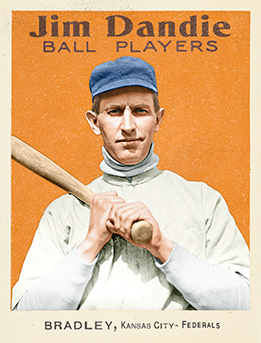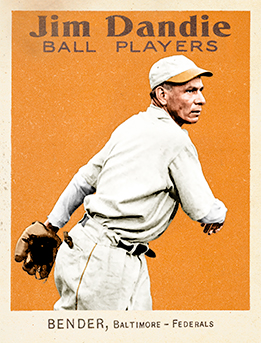- Series: Jim Dandie Feds
- City: Baltimore
- Team: Terrapins
- League: Federal League
- Hall: National Baseball Hall of Fame
Charles Albert Bender (1884-1954) won 212 games en route to a Hall of Fame career. He began life amid the abject poverty of a Minnesota reservation, was mentored by Pop Warner at the Carlisle Indian School and hit the majors with a bang for the Athletics in 1903. “Albert” as Connie Mack called him, beat future Hall members Cy Young and Clark Griffith compiling 17 wins in his rookie season. He led the league 3x in win percentage but was at his best under pressure. In 5 World Series, Bender won 6 games with a 2.44 ERA and completed 9 of his 10 starts.
- Connie Mack said that of all his players he would most trust Bender to win in the clutch
- Admired for his brilliance, Ty Cobb dubbed him the most intelligent pitcher he ever faced
- Elected to Hall of Fame: 1953

- Series: Jim Dandie Feds
- City: Kansas City
- Team: Packers
- League: Federal League
William Joseph Bradley (1878-1954) played third base better than anyone in the new American League until he was slowed by injury in 1906. Having jumped to the junior circuit from the Chicago Orphans in 1901, Bradley set batting and fielding marks for his hometown Cleveland Blues that would only be eclipsed by the likes of Ty Cobb and Home Run Baker. His pinnacle year came in 1902 when he batted .340, scored 104 runs with 39 doubles and 11 home runs, all putting him in the top five or six in the league. Bradley's output declined markedly following his injury-shortened season in '06. He stayed with Cleveland through the 1910 campaign, still playing regularly but seeing a great drop-off at the plate. He went to the International League's Maple Leafs as player-manager in 1911 but returned to the majors as manager for the Brooklyn Tip-Tops in the new Federal League where he put himself in as an occasional pinch hitter.The team's 77-77 record was good for a fifth-place finish. The next, and last, year for the Federal League saw him with the Kansas City Packers where Bill returned to a back-up role at third, playing in about half the club's games. Though known for his excellent fielding, Bradley figured uncharacteristically in a Cleveland no-hitter in 1908. Bob Rhoads hurled the gem but was shocked when he learned the hit he thought he'd surrendered on a grounder to Bradley had been ruled a rare error. His dazzling play at his position was a throwback to the earlier no-glove era as he mastered a bare-handed scoop-and-toss to throw out attempted bunters, per Stephen Constantelos of SABR. His rival as the best third-sacker of that decade, Jimmy Collins of Boston, told an admiring fan: “Well, if I could field and bat like Bradley, I should lay claim to that title myself.”
- On September 24, 1903 Bradley hit for the cycle in D.C. with 12 total bases
- Bradley's physical issues in 1906 had been presaged by a mysterious illness in '05 when his average began to drop. An intentional inside pitch from NY's Bill Hogg broke Bill's wrist, the first of a series of injuries that would plague him for the rest of his MLB tenure
- Hogg removed any doubt about his intention to disable Bradley when he vowed “The big Frenchman (Nap Lajoie) is next on my list.”

